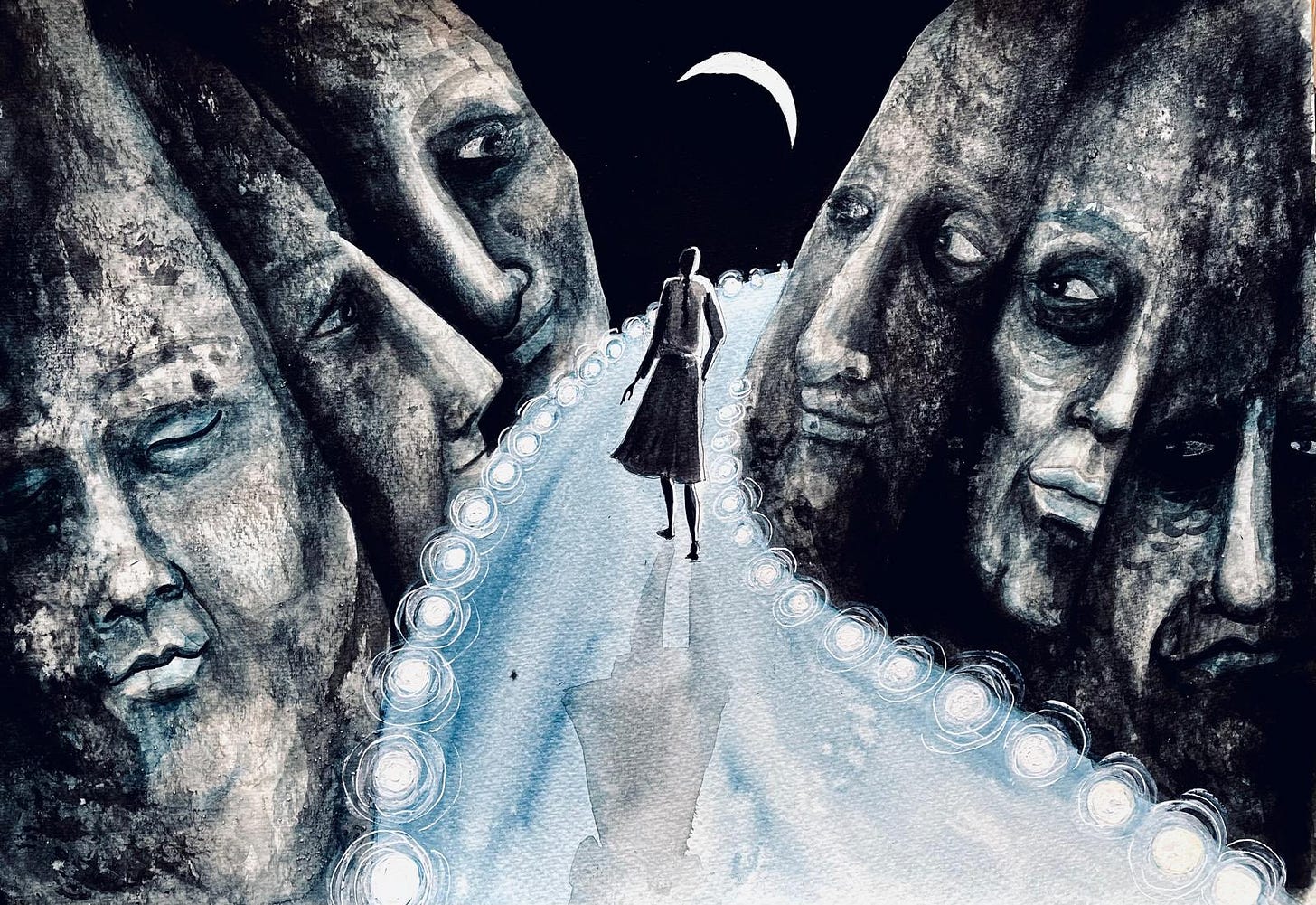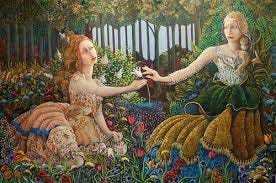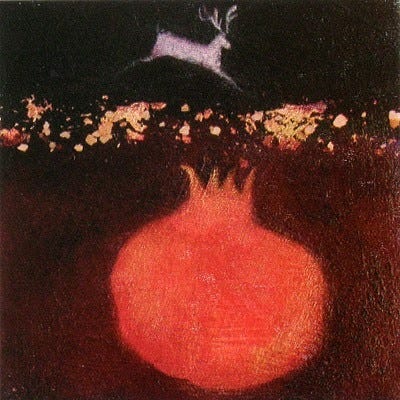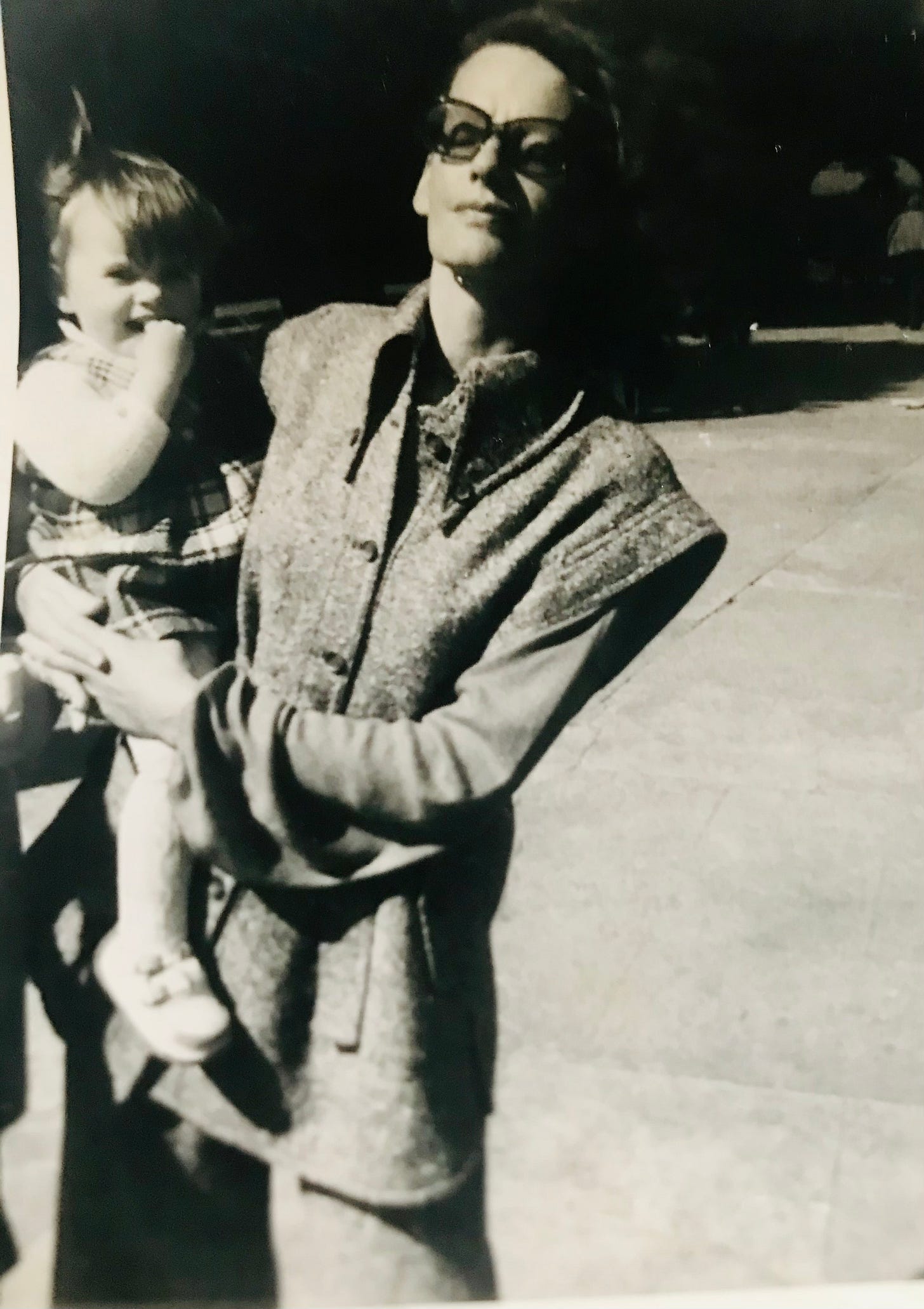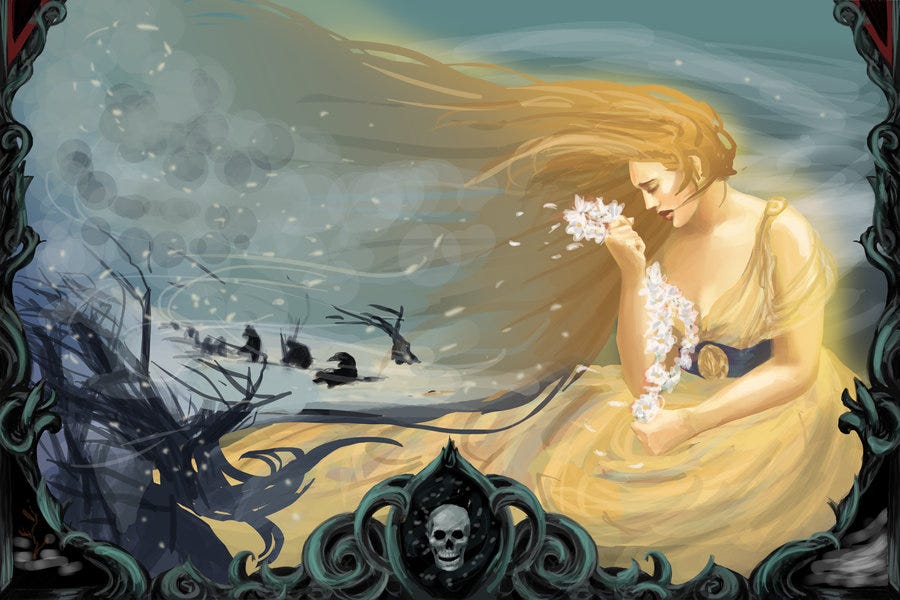Persephone, Queen of the Underworld (And Christmas)
Of Descending Goddesses, Axe-wielding Bishops and the Pomegranate
ArtWork by Jakki Moore
Well, I’m taking a break from mermaids and snakes this time around. It’s Christmas after all, why not be cheerful? Not that mermaids and serpents aren’t, but the latter haven’t earned a reputation for cheer, and have been blamed for a whole pile of things. But anyway, is Christmas even that cheerful? It tends to rattle the hell out of a lot of people, especially those with oddly-shaped families, estranged families, non-families… those who live on the edge, uncertain of where they belong. Those who haven’t a home. And Scrooges. Barrages of flashing lights, tinsel and turkeys cowering on farms waiting for the chop and the pluck, the relentless drone of ‘Faery Tale in New York’ and that song about the chap in the trenches with the trumpets parping away that can follow you anywhere…(Jona Lewie’s Stop the Cavalry brilliant anti-war song that hit the charts in the 1980s, but it’s been played to death), and the boring-ness of George Michael’s ‘Last Christmas’… it’s part of the reason I stay away from shops around this time of year. When I hear those battered choonz over the air, I want to run for the hills (and the trees). Long ago when there was healthy seasonal political satire, before Hate Speech Laws were even a twinkle in the eye of Irish polticians, there were tunes like ‘Lannigan’s Ball’ taking the piss out of Fianna Fáil…sung by Frank Kelly, who you know as Father Ted. The scratchy 10” single was played on our Record Deck by the Christmas tree in 1980. ‘Gibbon stepped out, Charlie stepped in again, learning to dance for Fianna Fáil’ a whole send up of Charlie Haughy’s 1970 gun running expedition.
On another Christmas note, we had a horrifying experience in Dealz the other day, buying sweets for a movie at the self-service till (all human cashiers were hiding), where the unit pay-deck(self service checkout) screamed and guffawed at us in all its sinister tinny-ness in an English accent to boot: “Enjoy your presents! Merry Merry Christmas!” We fled. There were so many assumptions in its aggressive cheery-ness it was too much to cope with.

So, what is it all about? The Christmas tree comes from the 12 Days of Yule, in which Pagans cut down a whole tree and burned it over those 12 Days to help the Sun God recover and to grow strong again at this dark time of year. When, in Geismar, Germany (723 A.D.), A Christian missionary called Winfrid Boniface found a crowd of pagans preparing sacrifice at an oak tree dedicated to Thor, he took an axe to the tree and decided that because Thor didn’t strike him down with his thunderbolt, Christianity had triumphed. But then he was killed for killing their holy tree, and for proclaiming the Evergreen was their holy tree.

Some say this was the beginning of the Christmas tree. It was traditional to bring evergreens into the home to encourage summer’s return. For Fertility and fortune. As would ivy and mistletoe and holly leaves.

The Greek myth of Persephone and Demeter is the story of winter and it’s corollary, spring. Persephone was Demeter's daughter. Demeter was a pretty mighty fertility goddess, also known as the ‘Barley Mother’ and the ‘Wise One of the Earth and Sea’. The Maiden abducted into the underworld, her daughter, was sometimes called Kore, sometimes Persephone. The worship of Demeter was well established at Mycenae in the 13th C and continued throughout Greece for 2,000 years, replaced by worship of Mithras and later of Christ. Her temple at Eleusuis, one of the greatest shrines in Greece, became the centre of an elaborate mystery religion. She was worshipped as "the Goddess" at Eleusis by Greek peasants throughout the Middle Ages, even up to the 19th Century, when she was entitled ‘Mistress of the Earth and Sea’ .
Back to the story of winter and spring. One day while Persephone was gathering flowers, Hades, god of the underworld, captured her. No one had any idea where she had gone to or what had happened to her.

Sick with worry, Demeter asked Helios the sun god what had happened. Hades, God of the Underworld had captured Persephone. Demeter was so angry that for a year she caused crops and plants to wither and die. A terrible famine gripped the earth.

Zeus commanded that Hades release Persephone. Some say that a woman trapped in a restricted relationship in which no light can penetrate, is archetypally like Persephone, Queen of the Underworld. Others say that in fact Persephone thrived as the wife of Hades. That she had embraced the darkness of uncertainty and change. That she was the bride of darkness, quietly incubating until Hades gave her pomegranate seeds (fertility)
Hades knew that if she ate anything from the land of the dead, she would have to return to him for a part of each year. In my Creative Writing Course, the Heroine’s Journey, Persephone is one of the most important archetypes we explore. For in her journey to the Underworld, is the secret to negotiating with The Black Dog, Life-Changing Loss, Confusion, Despair and Rage. There is no sense of time in the Underworld, you can’t rush your stay. You are naked, walking on the bones of the dead. You move not to and from the Light, the Sun God, but down, down into the depths of being. No way out. Until the time has come and a chink of light creeps through the crack in the cave. And you might be lucky. You might meet spring.
Innana, the Sumerian Goddess, Queen of Heaven and Earth, met Ereshkigal, her sister, Queen of the Dead who took everything from Innana and left her on a peg to rot and die. Innana had come to observe the funeral rites of Gugalanna, the Bull of Heaven.
Quiet, Inanna, the ways of the underworld are perfect
They may not be questioned.
(Wolkstein and Kramer 58-60)
The galla demons of the underworld accompany Innana up to the earth's surface to claim her substitute. The demons try to take Inanna's sons Shara and Lulal and even Inanna's beautician Cara but she prevents them because all those the demons prey on are dressed in sackcloth, mourning for her seeming death.
Artwork by Jakki Moore
Innana’s lover Dumuzi, is found “dressed in his shining…garments…on his magnificent throne” she is enraged that he hasn’t bothered to mourn her, and commands the demons to seize him. Dumuzi appeals to the sun god Utu for help and is transformed into a snake (sorry I couldn’t resist at least one snake this Christmas!) in order to escape but is caught and carried away to the underworld. Dumuzi's sister, Geshtinanna, volunteers herself to go in his place and it is decreed that Dumuzi will spend half the year in the underworld and Geshtinanna the other half. Much like Persephone.
There is always the fear of what the Descent will do us. Will we be ground down, will winter ‘pulverise me, eat me up, and spit me out. Yet the Descent is a compulsion.’ Adrienne Rich
I, like Persephone (and millions more, whether physically or emotionally) am separated from my Mother. My mother frequently visited the Underworld in its modern form- psychiatric hospitals. As a child I would miss her terribly while she was locked up in that dark, grey building. Later, it was a yellow one, down the road. I came to understand that she had demons. They drugged her relentlessly. (This eventually killed her). Drugging is the worst remedy for demons. It is in fact, one’s own willingness to face them, that vanquishes them. And my mother could not vanquish them. She could not even speak to them, never mind face them.
She became a Shadowmother, the title of a book I wrote about motherhood and mothers and their demons. At my dear mother’s funeral, I read a poem for her that I had written on the last morning of her life.
THE MOON AND MY MOTHER
We sat by the river, picking garnets out of pomegranates
Wishing, under the moon, that the first steps I took
Under the birch tree could be retraced-
Like a silver map through time.
And we could know that the spiders that watched
Had no malice
And the wolves creeping behind the trees
Were not hungry.
That by the river, under the moon,
The world held us.
And my little feet knew
The tickle
Was nothing more
Than a lady bird going home.
Ave Maria
Thank you Mother.
Thank you Jenny.
© Siofra O’Donovan, 2 August 2018
We are reborn in the darkness. Christmas is this great, jolly, shiny, noisy thing that does everything it can to take us away from the Descent. We don’t hibernate, we charge around after gifts for family and friends, willing them into the false cheer, and filling the house with food, as if the house itself was a fat hog with an insatiable appetite. Don’t get me wrong, I do these things too. It’s a winter feast. I’m not just a Scrooge.
If you would like to explore the Descent and the Separation from the Truths of the Dark Winter, and the marvels of the Underworld (within you) and the Fragmentation of the Mother-Daughter (and Son) relationship, through Myth and Meditation, please join us for the Heroine’s Writing Journey starting in January 2023. Merry Yule, Christmas, Michaelmas and most important of all, don’t forget to turn OUT the lights. Or you won’t have a shining spring to look forward to, because you’ll have left nothing behind in your Underworld.



